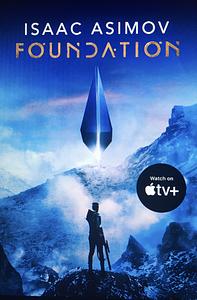Take a photo of a barcode or cover
I struggled to get into Asimov's iconic series when I was younger, so I figured I'm due to give it another (hopefully fairer and wiser) try. While I certainly better appreciated the book's massive influence this time around, and was not nearly as bored by the continually shifting parade of characters, I also felt like the book is showing its age more than ever.
First, the brilliant: The twists and turns of the plot are fantastic. I remembered little beyond the basic premise of the genius who predicts the future of civilization, and while in real life I'm extremely skeptical that humans are capable of successfully predicting the behaviors of other chaotic humans, even in broad strokes, much less channeling such behaviors into a stream that spans decades, Asimov does such a masterful job slowly unfolding the intriguing story that it just makes you wanna go, ok, forget about black swans and unpredictable technological advances and everything else, if it was possible, wouldn't this be cool? The initial teased explanations of Seldon's "psychohistory" are mere tropy technobabble ("validity of the set-transformation.... forbidden socio-operation"), but at its best, especially later in the book, the sweeping explorations of politics, religion, and economics are both reasonable and clever. The tension between the idea that the plan only works if no one knows about it and the idea that people won't trust the plan to let it work unless they know about it makes for a fascinating paradox, to state just one of the thought-provoking concepts Asimov presents us.
I also appreciated the book's compact structure. If someone were writing this story today, they would probably try to tell this single book in a five-part volume of several hundred pages each (or perhaps a multi-seasonal streaming television series....?). Asimov focuses the story on five acts representing the most important hinge points of a century's worth of time, but he's even more targeted than that. By stripping out the majority of the action and skipping each chapter to the next important dialogue, Asimov continually advances the plot, explains the consequences of the last action, and sets up the next one, all within a couple hundred relatively small pages. While this occasionally makes for confusion on the one hand or stilted over-explaining on the other, for the most part it's a smart storytelling device.
Second, the neutral: As one of the first popular science fiction writers, Asimov's influence on the genre is undeniable. While I can't be certain of the true origins of any individual element without engaging in heavy research, Foundation, published in 1951, abounds in recognizable features of later sci-fi, from major concepts (the idea of preserving knowledge through an apocalypse was later explored in A Canticle for Leibowitz, 1959) to minor sociological commentary ("coming out into the open with nothing but sky over you might just give you a nervous breakdown" - sound like Belters to anyone?). I especially noticed the Foundation's fingerprints all over Star Wars, starting with the globally urban planet of Coruscant, I mean Trantor (!), continuing through the vaguely-realistic-but-slightly-modified character names (Gaal. Han. Salvor. Poe. Jaim. Dak. (!!)), and on through the ship with "nuclear blasts capable of blowing up a planet" (!!!) Oh, and how about that nuclear "drill" that comes out of a "sheath" and slices straight through metal? (Ok, maybe that one's a bit of a stretch... but they did try to keep that "technology" in the hands of an "ancient religion"...)
Speaking of nuclear technology... it's commonly observed that science-fiction "predicts" the future in a way that ultimately betrays the historical era it was written in. (Even in my new favorite series The Expanse, the characters of an unspecified future century have an amusingly consistent knack for operating "hand terminals" like iPhones from the 2010's.) I can't speak for the rest of the series yet, but the first Foundation book is oozing in 1950's. In clear whispers of the post-WWII Cold War era, everything is nuclear in Asimov's universe. Nuclear guns, nuclear shields, nuclear drills. And everything else about society is stuck in the 1950's. Seriously. It started out quaint and amusing, but it's so pervasive that it kept distracting me from the story. Our first character lands on a planet via a spaceship that still carries physical mail, pays for a taxi with physical coins (yes but it's an air taxi), and gets to his room via an elevator with a human elevator operator! It's almost like the only real anticipated technological development in twelve thousand years in Asimov's universe is... spaceships. Which, granted, is a huge thing to anticipate eighteen years before the moon landing, or six years before freaking Sputnik! But still. For a story that's supposed to suspend my disbelief about the possibility of successfully predicting the future, it's at least a little ironic, don't you think?
Finally, the negative. Speaking of the 1950's. The three human employees our first character had to go through to get to his hotel room? They're all men. The spy who shadows him? 'nother man. The people on the council? All men. The priests? Men. The soldiers? The spaceship crew? The leaders on the other planets? Men. Men. Men. I was starting to wonder if females even existed anymore in Asimov's techno-future (maybe men just spring up out of holes in the ground?) when, finally, 78% of the way through the book, we get our first female character. And... she's literally the most stereotyped, infantilized, look-at-this-pretty-necklace female character imaginable! Seriously Asimov??? I know times have changed, but I don't think it's unreasonable to at least be a little disappointed here. If we consider just political characters... the first woman was elected to the United States Congress before Asimov was born. By the time he was writing this novel, the percentage of women in the House of Representatives had slowly but consistently crept up to about 2%. I'm not even asking for him to imagine a utopian future of total equality here, how about just not totally completely 100% male every time, every planet, every where.... Was that really so impossible to imagine? (Tho I am curious to see how this element plays out as the series progresses through its publication years) I can't help but feel that all of these dated factors at least somewhat threaten to undermine this book's continued relevance.
But neither am I ready to throw out Asimov's genius altogether. If I recall correctly, though quite hazily, the second book takes the skepticism of psychohistory's reliability and elevates it into a major and fascinating plot point...
First, the brilliant: The twists and turns of the plot are fantastic. I remembered little beyond the basic premise of the genius who predicts the future of civilization, and while in real life I'm extremely skeptical that humans are capable of successfully predicting the behaviors of other chaotic humans, even in broad strokes, much less channeling such behaviors into a stream that spans decades, Asimov does such a masterful job slowly unfolding the intriguing story that it just makes you wanna go, ok, forget about black swans and unpredictable technological advances and everything else, if it was possible, wouldn't this be cool? The initial teased explanations of Seldon's "psychohistory" are mere tropy technobabble ("validity of the set-transformation.... forbidden socio-operation"), but at its best, especially later in the book, the sweeping explorations of politics, religion, and economics are both reasonable and clever. The tension between the idea that the plan only works if no one knows about it and the idea that people won't trust the plan to let it work unless they know about it makes for a fascinating paradox, to state just one of the thought-provoking concepts Asimov presents us.
I also appreciated the book's compact structure. If someone were writing this story today, they would probably try to tell this single book in a five-part volume of several hundred pages each (or perhaps a multi-seasonal streaming television series....?). Asimov focuses the story on five acts representing the most important hinge points of a century's worth of time, but he's even more targeted than that. By stripping out the majority of the action and skipping each chapter to the next important dialogue, Asimov continually advances the plot, explains the consequences of the last action, and sets up the next one, all within a couple hundred relatively small pages. While this occasionally makes for confusion on the one hand or stilted over-explaining on the other, for the most part it's a smart storytelling device.
Second, the neutral: As one of the first popular science fiction writers, Asimov's influence on the genre is undeniable. While I can't be certain of the true origins of any individual element without engaging in heavy research, Foundation, published in 1951, abounds in recognizable features of later sci-fi, from major concepts (the idea of preserving knowledge through an apocalypse was later explored in A Canticle for Leibowitz, 1959) to minor sociological commentary ("coming out into the open with nothing but sky over you might just give you a nervous breakdown" - sound like Belters to anyone?). I especially noticed the Foundation's fingerprints all over Star Wars, starting with the globally urban planet of Coruscant, I mean Trantor (!), continuing through the vaguely-realistic-but-slightly-modified character names (Gaal. Han. Salvor. Poe. Jaim. Dak. (!!)), and on through the ship with "nuclear blasts capable of blowing up a planet" (!!!) Oh, and how about that nuclear "drill" that comes out of a "sheath" and slices straight through metal? (Ok, maybe that one's a bit of a stretch... but they did try to keep that "technology" in the hands of an "ancient religion"...)
Speaking of nuclear technology... it's commonly observed that science-fiction "predicts" the future in a way that ultimately betrays the historical era it was written in. (Even in my new favorite series The Expanse, the characters of an unspecified future century have an amusingly consistent knack for operating "hand terminals" like iPhones from the 2010's.) I can't speak for the rest of the series yet, but the first Foundation book is oozing in 1950's. In clear whispers of the post-WWII Cold War era, everything is nuclear in Asimov's universe. Nuclear guns, nuclear shields, nuclear drills. And everything else about society is stuck in the 1950's. Seriously. It started out quaint and amusing, but it's so pervasive that it kept distracting me from the story. Our first character lands on a planet via a spaceship that still carries physical mail, pays for a taxi with physical coins (yes but it's an air taxi), and gets to his room via an elevator with a human elevator operator! It's almost like the only real anticipated technological development in twelve thousand years in Asimov's universe is... spaceships. Which, granted, is a huge thing to anticipate eighteen years before the moon landing, or six years before freaking Sputnik! But still. For a story that's supposed to suspend my disbelief about the possibility of successfully predicting the future, it's at least a little ironic, don't you think?
Finally, the negative. Speaking of the 1950's. The three human employees our first character had to go through to get to his hotel room? They're all men. The spy who shadows him? 'nother man. The people on the council? All men. The priests? Men. The soldiers? The spaceship crew? The leaders on the other planets? Men. Men. Men. I was starting to wonder if females even existed anymore in Asimov's techno-future (maybe men just spring up out of holes in the ground?) when, finally, 78% of the way through the book, we get our first female character. And... she's literally the most stereotyped, infantilized, look-at-this-pretty-necklace female character imaginable! Seriously Asimov??? I know times have changed, but I don't think it's unreasonable to at least be a little disappointed here. If we consider just political characters... the first woman was elected to the United States Congress before Asimov was born. By the time he was writing this novel, the percentage of women in the House of Representatives had slowly but consistently crept up to about 2%. I'm not even asking for him to imagine a utopian future of total equality here, how about just not totally completely 100% male every time, every planet, every where.... Was that really so impossible to imagine? (Tho I am curious to see how this element plays out as the series progresses through its publication years) I can't help but feel that all of these dated factors at least somewhat threaten to undermine this book's continued relevance.
But neither am I ready to throw out Asimov's genius altogether. If I recall correctly, though quite hazily, the second book takes the skepticism of psychohistory's reliability and elevates it into a major and fascinating plot point...
emotional
tense
slow-paced
Plot or Character Driven:
Plot
Strong character development:
No
Loveable characters:
No
Diverse cast of characters:
No
Flaws of characters a main focus:
Complicated
I loved the concept that powers the plot of this book and within 20 pages I was hooked. It's a great read but because the plot sprawls over such huge time periods, we don't get to spend a great deal of time with the characters. We get to know characters in their time of crisis then jump forward 50 years to a new set of characters and a new catastrophe. It almost reads like a set of tightly connected short stories. The themes in the book, religion, intergalactic trading, atomic power, empire-building are all brought to fore through the narrative and aren't clumsily shoe-horned in. The political power plays are great. There's some real 4d chess being played and some of the checkmates pack a real punch.
Looking forward to the next in the series.
Looking forward to the next in the series.
Sure is delightful. Asimov always makes me want to read more
I can see the roots of many Science Fiction elements we have in the genre today.
Very slow start. I almost abandoned it. Also a bit disorienting as the parts of the book throw out characters and basically start fresh several times. But it grew on me and by the 50% mark or so I was hooked on both the story, but he cleverness of the characters, and the social commentary that is the real story of the book.
honestly i had higher hopes of actually Getting Into™️ this book. i can see the vision and i appreciate the writing, but somehow i just really struggled with caring about each individual crisis and the longevity of the foundation. don’t think i’ll be reading the sequels any time soon, and trust me i am just as disappointed as anyone out there.
adventurous
fast-paced
Plot or Character Driven:
Plot
Strong character development:
No
Loveable characters:
Yes
Diverse cast of characters:
Complicated
Flaws of characters a main focus:
No
reflective
medium-paced
Plot or Character Driven:
Plot
Strong character development:
No
Loveable characters:
No
Diverse cast of characters:
No
Flaws of characters a main focus:
No
Read the book after watching the show, where are my girls Gaal and Salvor 😭 where is Raych 😭 where is sexy evil emperor 😭





